A smooth and efficient product search is essential for any eCommerce website because it allows your customers to find the items they want to buy.
However, it’s not uncommon for store owners to run into issues where the product search feature stops working properly, leading to frustrated customers and lost sales.
If your WooCommerce search isn’t working correctly, then users won’t be able to find the products they are looking for. This can result in a poor user experience, abandoned carts, and fewer sales.
We’ve been using WordPress for over a decade, adding search forms to our blogs and eCommerce stores. Along the way, we’ve come across many issues with the search form not working properly. After thorough troubleshooting, we’ve put together a list of tips that make it easy to fix search form problems.
In this article, we’ll show you what to do when the WooCommerce product search is not working. We’ll also explain how to improve the search feature with SearchWP, a powerful search plugin that we use on many of our own websites.
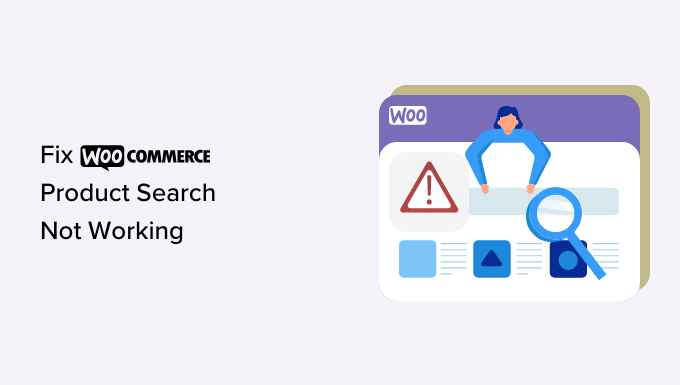
The Importance of WooCommerce Product Search
Without a functional search tool, users won’t be able to browse through your product catalog and make purchases in your WooCommerce store.
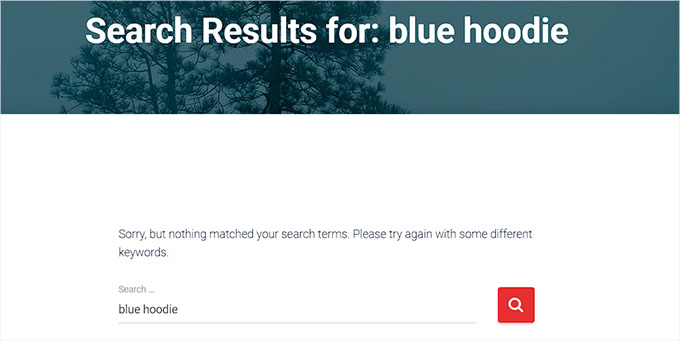
This can result in frustrated customers leaving your site, skyrocketing bounce rates, and decreasing profits.
In turn, it can damage your store’s reputation. If many people struggle to use your online store, then they may go to your competitors instead.
This common issue may cause your website SEO to suffer because search engines consider search functionality when they rank websites.
If your site has lower rankings in the search results, then fewer customers will be able to find and purchase your products online.
By fixing the WooCommerce search feature, you can improve the customer experience, making it easier for shoppers to find what they are looking for and make more sales.
Expert Tip: Feeling overwhelmed trying to fix errors on your WordPress website? WPBeginner now offers On-Demand Support services at an affordable price.
Whether it’s theme and plugin issues, 404 errors, or search form glitches, our experts will quickly get your website back on track, minimizing downtime and lost revenue.
With 24/7 support designed for small businesses, we’ll take care of the technical hiccups so you can focus on growing your business. To learn more, see our WPBeginner Pro Services page.
That being said, you can follow the steps in our troubleshooting guide and learn what to do when the WooCommerce product search is not working:
- Step 1: Check With Your Hosting Provider
- Step 2: Deactivate Plugins
- Step 3: Update the WooCommerce Database
- Step 4: Check Catalog Visibility Settings
- Step 5: Reindex WooCommerce Products
- Improve WooCommerce Product Search With SearchWP
- Bonus: Add GTIN, ISBN & MPN Schema in WooCommerce to Improve Search Visibility
Step 1: Check With Your Hosting Provider
The most common reason the search feature isn’t working is because of your WordPress hosting.
The server hosting your site may not have enough resources to handle a large number of WooCommerce products at once.
This server may also have some software restrictions that limit the amount of available memory and prevent the search feature from working correctly.
If this is the case, then you can try contacting your hosting provider’s customer support, as this problem cannot be solved from your end. They can help you figure out if the eCommerce search isn’t working due to the server and help you fix the issue.
However, if the issue is not with your hosting, then you will need to move on to the next step.
Step 2: Deactivate Plugins
The WooCommerce product search may not be working because of an outdated or new plugin on your WordPress website that is causing some errors.
This can happen if a plugin has bugs in its software or isn’t compatible with other plugins on your website.
You can easily fix this issue by deactivating every plugin apart from WooCoomerce on your site.
First, you must visit the Plugins » Installed Plugins page from the WordPress admin sidebar. Once you are there, just select all the activated plugins except WooCommerce from the list.
Next, simply choose the ‘Deactivate’ option from the ‘Bulk actions’ dropdown menu and click on the ‘Apply’ button to deactivate all the plugins on your site.
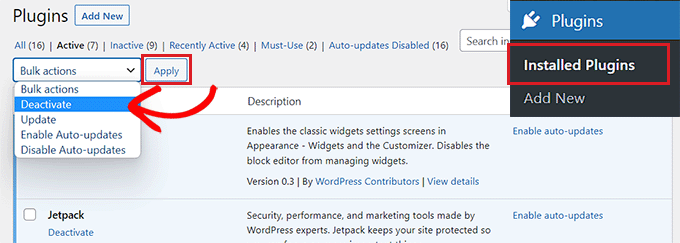
Now, you can visit your website to check if this has fixed the issue.
If it has, then simply activate the plugins one by one until you can find the one causing the error. You will then need to look for an alternative plugin or contact the developers for support.
If deactivating plugins didn’t fix the issue, then keep reading to solve the problem.
Step 3: Update the WooCommerce Database
A corrupted database can be another reason that the WooCommerce search is not working.
For instance, you may have imported a large number of products as a CSV file, which is causing a problem with the database.
To fix this issue, you will need to update the WooCommerce database. Make sure to create a complete backup of your website before updating its database.
First, head over to the WooCommerce » Status page from the WordPress sidebar.
Once you are there, simply switch to the ‘Tools’ tab and click the ‘Regenerate’ button next to the ‘Product lookup tables’ option.

After that, scroll down to the ‘Update database’ option and just click the button next to it.
This will update the WooCommerce plugin’s database to the latest version.

Next, simply visit your online store to check if the issue has been resolved.
Step 4: Check Catalog Visibility Settings
Another reason for this problem could be that you have set your products’ catalog visibility to ‘Shop only’ or ‘Hidden’.
With these settings, the products won’t show up in the search results in your online store.
To check this, visit the Products » All Products page from the WordPress admin sidebar and click on the ‘Edit’ link under a product name.
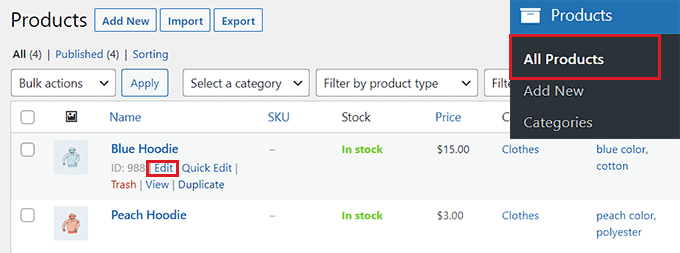
Once you are on the product page, simply click the ‘Edit’ link under the ‘Catalog visibility’ option in the ‘Publish’ section on the right.
This will open up a list of visibility choices.
From here, you need to make sure that the catalog visibility is set to ‘Shop and search results’.
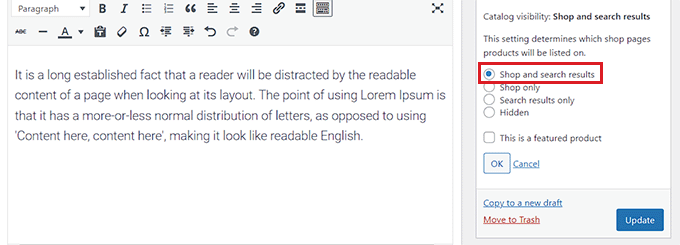
After that, click the ‘OK’ button to save your changes and debug the error. Then, simply click the ‘Update’ button.
Now, visit your website to check if the WooCommerce search is working. If it isn’t, then you will need to keep reading our tutorial.
Step 5: Reindex WooCommerce Products
You may not have indexed your Woocommerce products properly, making the search feature inaccessible.
To reindex the products, head to the Products » All Products page from the WordPress dashboard. From here, check the box at the top of the list to select all the products.
After that, select the ‘Edit’ option from the ‘Bulk actions’ dropdown menu and click the ‘Apply’ button.
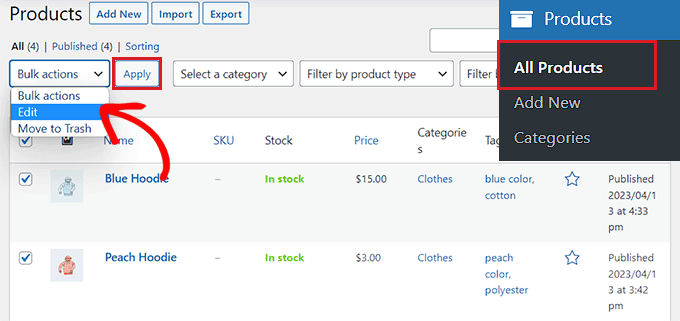
This will open up the ‘Bulk Edit’ tab on the page.
From here, simply click the ‘Update’ button to reindex all the WooCommerce products.
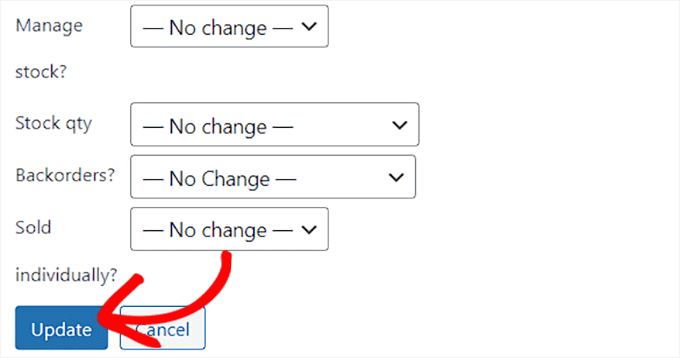
Once you have done that, you need to visit your website to test the search form results.
Improve WooCommerce Product Search With SearchWP
If you have tried all the steps above to fix WooCommerce product search and it hasn’t worked, then it’s time for you to switch to a search plugin.
This is where SearchWP comes in.
It is the best WordPress search plugin on the market that can help you improve WooCommerce product search by automatically replacing the default WordPress search with a more powerful search feature.
It puts you in complete control of the WordPress search algorithm and builds an index that matches search keywords in content, titles, categories, tags, shortcodes, documents, products, and more.
Several of our partner brands are currently using this solution to improve their site’s search form and have reported amazing results. For details, see our SearchWP review.

First, you will need to install and activate the SearchWP plugin. For more detailed instructions, see our guide on how to install a WordPress plugin.
Upon activation, head over to the SearchWP » Settings page from the admin sidebar and switch to the ‘General tab.
Here, you have to copy and paste the license key into the ‘License Key’ field. You can get your key from the ‘SearchWP Accounts’ page on the SearchWP website.
After that, simply click the ‘Activate’ button.
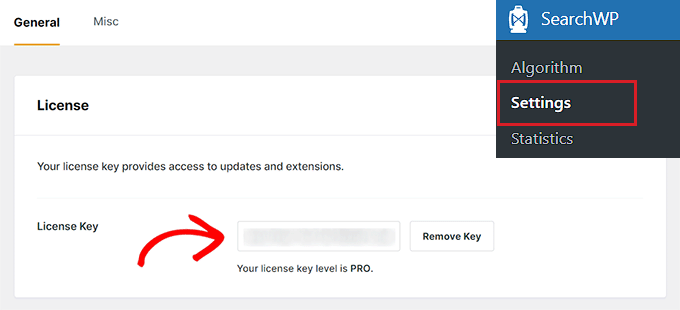
Next, you have to visit the SearchWP » Extensions page from the admin sidebar.
From here, click the ‘Install’ button under the ‘WooCommerce Integration’ extension. Upon installation, the extension will be activated automatically.
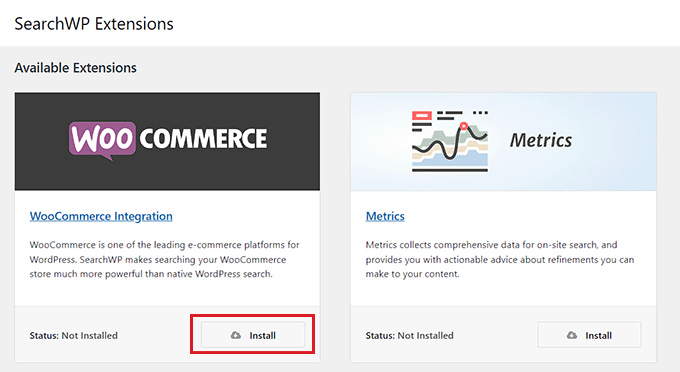
Next, head over to the SearchWP » Algorithm page from the WordPress dashboard and click the ‘Source and Settings’ button.
This will open a popup where you must check the ‘Products’ option to add WooCommerce products as a search source.
After that, click the ‘Done’ button to continue.
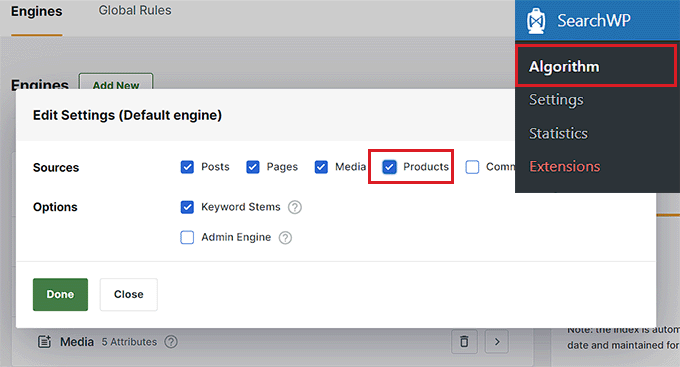
Now, if you scroll down, you will see a new ‘Products’ section added to the list of search sources.
By default, SearchWP will look at the product title, content (description), slug, and excerpt (short description) for search matches. You can add relevance (importance) to these search attributes by moving the sliders next to them.
For more detailed instructions, you may want to see our tutorial on how to make a smart WooCommerce product search.
Depending on how your site is set up, you may also be able to search for other content by clicking on the ‘Add/Remove Attributes’ button.
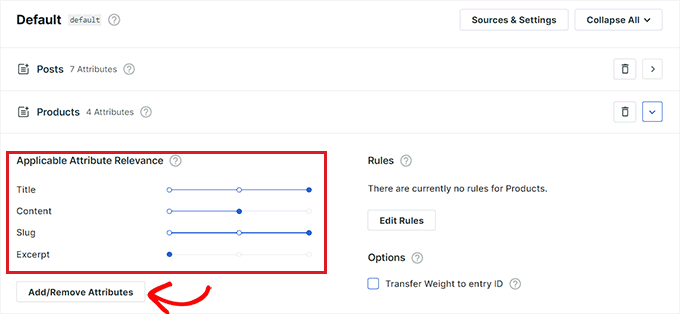
This will open up a popup from where you can add custom fields and taxonomies to the attributes as well.
Improve WooCommerce Product Search With Categories, Tags, SKUs, and Other Attributes
To make your WooCommerce product search more accurate, we recommend adding categories, tags, and SKUs as search sources using SearchWP.
Once the ‘Add/Remove Attributes’ popup appears, simply start by typing ‘SKU’ into the ‘Custom Fields’ box. For more information, we recommend reading our guide on how to enable search by product SKU in WooCommerce.
After that, select the ‘Product categories,’ ‘Product tags,’ and other product attributes from the ‘Taxonomies’ dropdown menu.
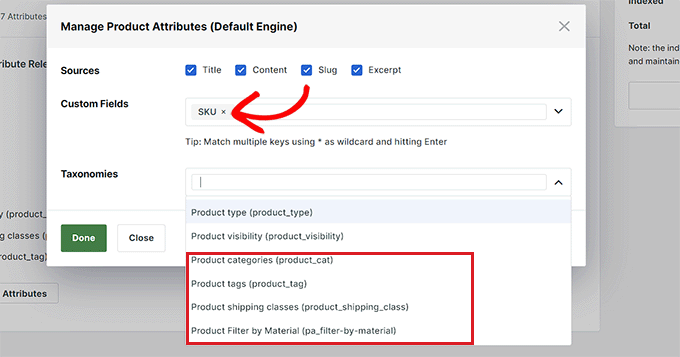
Once you have done that, click the ‘Done’ button to save the changes.
Now that tags, SKUs, and categories have been added as search sources, move the slider next to these options to assign weight to these attributes.
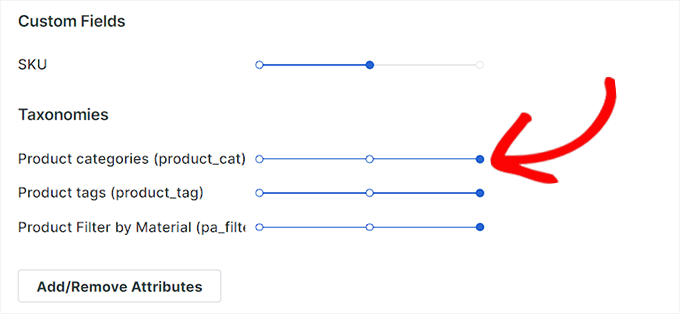
Note: If you don’t know how to create tags, categories, and attributes for your products, please see our tutorial on how to add product tags, attributes, and categories to WooCommerce.
After you have finished configuring settings for SearchWP, simply click the ‘Save’ button at the top.
Now, the default search box on your WooCommerce store will be automatically replaced by SearchWP.
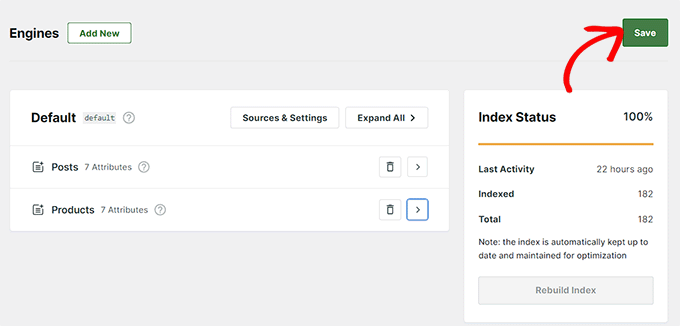
Finally, you can visit your storefront to check out the new and improved WooCommerce product search box.
This is what it looked like on our demo site.

Bonus: Add GTIN, ISBN & MPN Schema in WooCommerce to Improve Search Visibility
Apart from improving and fixing your website search issues, you can also add the GTIN, ISBN, and MPN schema to your WooCommerce products to provide detailed information to search engines.
This can help increase your product visibility, meaning that when users search for a specific ISBN, GTIN, or MPN, your products will show at the top of the search results.
You can easily add the GTIN, ISBN, and MPN schema to your WooCommerce products using All In One SEO. It is the best WordPress SEO plugin on the market that comes with a schema markup feature.

We have been using this plugin at WPBeginner and have since observed better search engine rankings for our posts. To learn more, see our AIOSEO review.
Upon activation, all you have to do is open a product page and scroll down to the ‘AIOSEO Settings’ section.
Here, switch to the ‘Schema’ tab and click the ‘Edit Schema’ button.
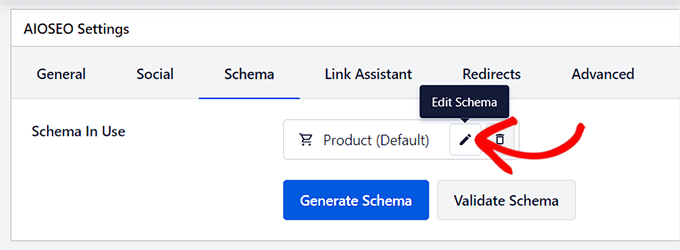
This will open a prompt on the screen where you can scroll down to the ‘Identifiers’ section and then add the ISBN, GTIN, or MPN details for the product. After that, click the ‘Save Changes’ button to store your settings.
For detailed instructions, see our tutorial on how to add GTIN, ISBN, & MPN schema in WordPress.
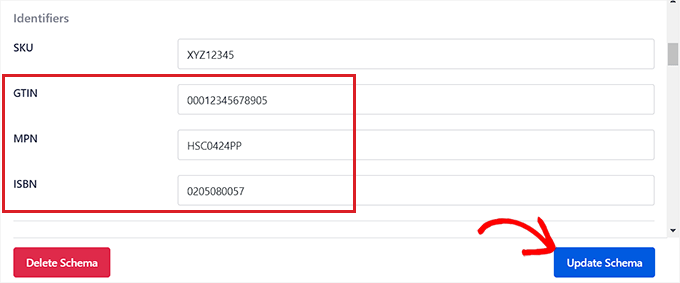
Additionally, All in One SEO comes with other features that can help your WooCommerce store rank higher, including a link assistant, headline analyzer, XML sitemaps, and more.
For more information, you can see our complete AIOSEO review.
We hope this article helped you learn what to do when the WooCommerce product search is not working. You may also want to see our step-by-step article on how to fix WordPress search not working and check out our expert picks for the best WooCommerce plugins to grow your online store.
If you liked this article, then please subscribe to our YouTube Channel for WordPress video tutorials. You can also find us on Twitter and Facebook.





Jiří Vaněk
I’m just starting with WooCommerce, and as a typical beginner, I managed to break it early on. However, your advice on reindexing products helped me a lot. I wouldn’t have thought of it myself since I only know WooCommerce superficially from experimenting with it. This method saved me from deleting the site and rebuilding the entire store from scratch. It saved me time from having to restore the site from a backup.
Ralph
I had no idea why one of my e-books was not showing up in the search results, but it was in the shop. I was so confused. It turns out it was “shop only” for some reason. Maybe I even clicked it by accident. This guide really helped me.
WPBeginner Support
Glad we could share the why and how to fix this
Admin